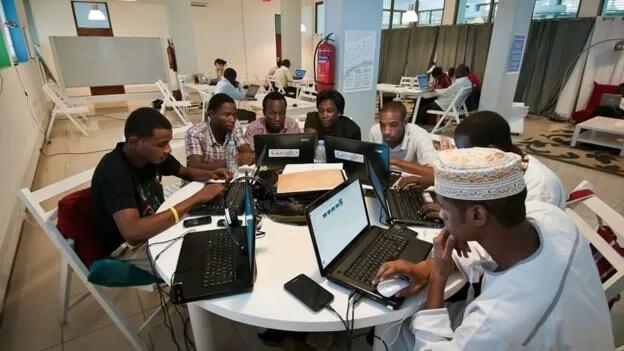Nigeria’s tech ecosystem is no longer emerging—it’s asserting itself. From nimble startups to billion-dollar businesses, the country’s innovators are pushing boundaries, solving real problems at scale, and earning global recognition. But to truly lead, Nigeria must combine bold ambition with strategic action and international collaboration.
Table of Contents

The resilience behind the innovation
In environments where infrastructure is unreliable, power supply is often erratic, and internet service can be patchy, Nigerian developers, designers, data scientists, and founders operate under immense pressure—but they thrive. They don’t just build apps or platforms; they design solutions resilient enough to withstand daily unpredictability and serve millions reliably.
This perseverance shapes a breed of professionals who focus on practicality, performance under constraint, and user-centred outcomes. They are not waiting to catch up—they’re currently outperforming, often under challenging circumstances.
The reality: talent is already global
It’s time to discard the narrative that Nigerian tech is ambitious but underdeveloped. Professionals from Nigeria are designing for Meta, Google, Amazon and Microsoft—even as they continue to build fintech, HR tech, agritech, and media platforms at home.
This isn’t potential—it’s active global influence. With Nigerian designers, developers, and product managers solving complex, high-scale problems, the discussion should shift from “emerging” to “recognised.”
What others did—and what Nigeria can emulate
The blueprint for global tech leadership is well-trodden. India didn’t establish its global IT reputation overnight; it was built through decades of investment in tech education, supportive policies, outsourcing of services, and a cohesive national message: “We belong at the global tech table.”
Eastern European countries like Ukraine and Poland forged global reputations through deliberate international partnerships and visibility. Nigerian tech doesn’t have to imitate their path, but we can adapt the scalable strategies.
Nigeria’s authentic path: homegrown problem‑solving
Unlike traditional outsourcing economies, Nigerian tech evolved through solving local challenges—from mobile payment barriers to unreliable logistics networks, creative economy monetisation, and offline-to-online commerce gaps.
This approach built digital solutions that are not just functional, but globally competitive. Platforms built for Nigeria are now scaling across Africa and beyond, offering real-world proof that our ecosystem is ready for global relevance.
Scaling momentum: What’s needed now
1. Infrastructure that meets ambition
Major tech cities like Lagos, Abuja, and Port Harcourt deserve scalable infrastructure. Lagos already hosts 23 of Nigeria’s 28 fastest‑growing tech firms, including heavyweights like Moniepoint (which raised $110M and achieved unicorn status), Paystack, PalmPay, Flutterwave, and PiggyVest. Yet challenges remain: inadequate tech parks, unreliable transit, poor power, and talent exodus due to living conditions.
Scaling requires investment in large‑scale workspaces, reliable transit, and power spaces built to hold thousands of working professionals and seed new clusters of innovation.
2. Talent pipelines and skills development
Nigeria’s youthful demographics mean a vast potential digital workforce. The 3 Million Technical Talent (3MTT) Programme aims to train millions in AI, cloud computing, cybersecurity, data science, UI/UX design and more by 2027—a deliberately ambitious government‑led initiative. Early results include staggering interest: over 1.7 million applicants and trained cohorts in every state.
We must deepen industry–university partnerships, strengthen digital literacy efforts like NITDA’s Digital States Initiative, and ensure that graduates are matched with real jobs across sectors.
3. Policy and regulatory clarity
Startups thrive in predictable policy environments. Government initiatives like broadband coverage expansion, consistent digital‑economy strategies, and regulatory support around fintech, data privacy, and cross‑border commerce are essential.
Clear import frameworks for tech hardware, incentives for R&D, and legal protections for intellectual property will attract both local and international investment.
4. Access to capital and global partnerships
Nigeria drew roughly $1 billion in VC funding in 2022, but 2024 saw a 7% drop in venture deals, especially outside fintech. Scaling beyond single sectors means democratizing capital access.
Domestic fintech champions like Moniepoint are drawing global funding, creating confidence in investors. Partnerships via hubs like Itana—Africa’s first digital free zone—provide pathways for companies to operate under favourable tax, immigration, and legal frameworks, enhancing global appeal.
Showcase successes, inspire emulation
Moniepoint, which raised $110M in late 2024, recently reached unicorn status and is expanding digital banking across eight African markets, processing over 800 million transactions monthly.
Paystack, founded in 2015 and acquired by Stripe for $200 million, is transformed from a local fintech to a continent-wide payment infrastructure, now serving over 60,000 businesses across Africa.
Such stories build credibility. Spotlighting them helps attract investors, policymakers, and aspiring entrepreneurs to believe in the ecosystem’s viability.

The deeper opportunities beyond fintech
Fintech may dominate headlines, but other sectors are ripe for global scaling. Consumer tech, agritech, health tech, creative economy platforms, edtech, and climate solutions are all burgeoning. AI-driven localisation, tailored educational platforms, remote healthcare access, and content creation tools can all transform sectors and compete globally.
Programs like NaijaCoder and local entrepreneurship labs foster grassroots skills development and early-stage innovation exposure—all crucial for seeding future startups arxiv.org.
International visibility matters
Nigeria isn’t invisible any longer—dealroom ranked Lagos the world’s top emerging tech hub in 2025, thanks to its density of high-growth companies. Nigerian graduates are working globally; collaboration extends from Lagos to London and Silicon Valley through remote work, open-source communities, mentorship programmes, and diaspora networks.
Consistent international engagement—hackathons, conferences, startup weeks, global expos—cements perceptions that Nigerian tech is not “promising” but already producing.
To lead: insist on scale, not just success stories
Individual founders building unicorns is impressive, but it’s not enough. Nigeria must embed structures that generate wave after wave of innovation. That means expanding hubs, replicating successful educational frameworks, connecting startups with global markets, and ensuring government accountability for tech‑enabling policies.
Nigeria has shown it can build solutions that outpace similar markets. Now it needs systems that amplify scale: a robust tech infrastructure, mass tech‑talent pipelines, investor confidence, entrepreneurial mentorship networks, and policy environments that foster—not inhibit—growth.
A collective mandate
This is a multi‑stakeholder mission. Government agencies must deliver broadband, skill training, and regulatory consistency. Universities and private learning platforms must produce job-ready talents. Incubators, accelerators, and corporate investors should back high-potential ventures beyond Lagos, into Tier‑2 cities. And entrepreneurs must continue solving real-life problems, with global aesthetics and scalable thinking.
What the next chapter looks like
- Infrastructure: working power, transit, and dedicated business or co‑working campuses in major cities. Think Lagos Tech Park, Abuja innovation districts, and Port Harcourt hubs.
- Education: scale-up initiatives like 3MTT and Digital States; integrate technology into secondary schools and university curricula; promote cross-sector learning.
- Capital access: seed funding beyond fintech; venture funds focused on agritech, health-tech, climate-tech; local and diaspora investors aligned with growth goals.
- Policy environment: clear rules, digital residency zones like Itana, predictable taxation, protection for startups, cross-border digital trade facilitation.
- International visibility: global conferences hosted in Nigeria, cross-border mentorship and remote hiring, showcasing success stories in global media.

What’s at stake—and what’s within reach
Nigeria sits at a crossroads. One path leads to a few iconic startups; the other to an innovation-led economy with global reach, exportable digital services, and continental influence. The difference hinges on scale.
“How Nigerian Tech Can Scale, Lead the World” isn’t just our focus phrase—it’s a mandate. Whether you’re a policymaker, investor, educator, or entrepreneur, the question is simple: how can we move from isolated wins to a full-scale engine of tech leadership?
Because Nigerian tech isn’t catching up. It’s already here. What remains is to build the foundation, open the channels, and let it lead.
Join Our Social Media Channels:
WhatsApp: NaijaEyes
Facebook: NaijaEyes
Twitter: NaijaEyes
Instagram: NaijaEyes
TikTok: NaijaEyes













![Tragic Incident: Fans of Seyi Vibez Die in Fatal Accident After Electrifying Lagos Concert [VIDEO] Seyi Vibez](https://naijaeyesblog.com/wp-content/uploads/2025/08/Seyi-Vibez-180x135.avif)


























